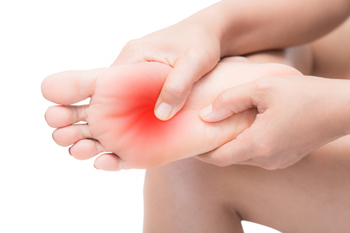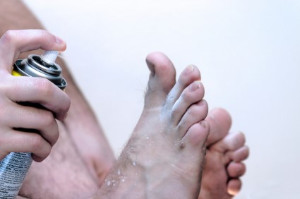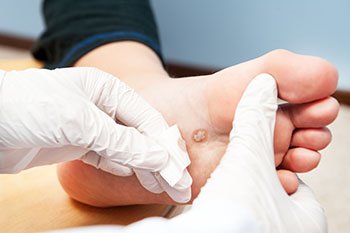Items filtered by date: June 2021
Uncomfortable Swollen Feet During Pregnancy
 One of the most common complaints pregnant women have is swollen feet, and they can generally begin to feel uncomfortable as the pregnancy progresses. This can happen as a result of the growing fetus which can put pressure on specific areas of the body, and it can occur from an increase in fluids and blood. Many women have found mild relief when they can frequently elevate their feet, and it may help to perform gentle foot stretches throughout the day. Additionally, it is beneficial to limit sodium intake, and wearing compression stockings may help with persistent swelling. If you are pregnant, and would like more information about why your feet are swollen and additional relief methods, please consult with a podiatrist.
One of the most common complaints pregnant women have is swollen feet, and they can generally begin to feel uncomfortable as the pregnancy progresses. This can happen as a result of the growing fetus which can put pressure on specific areas of the body, and it can occur from an increase in fluids and blood. Many women have found mild relief when they can frequently elevate their feet, and it may help to perform gentle foot stretches throughout the day. Additionally, it is beneficial to limit sodium intake, and wearing compression stockings may help with persistent swelling. If you are pregnant, and would like more information about why your feet are swollen and additional relief methods, please consult with a podiatrist.
Pregnant women with swollen feet can be treated with a variety of different methods that are readily available. For more information about other cures for swollen feet during pregnancy, consult with Dr. Odin De Los Reyes from Connecticut. Our doctor will attend to all of your foot and ankle needs.
What Foot Problems Can Arise During Pregnancy?
One problem that can occur is overpronation, which occurs when the arch of the foot flattens and tends to roll inward. This can cause pain and discomfort in your heels while you’re walking or even just standing up, trying to support your baby.
Another problem is edema, or swelling in the extremities. This often affects the feet during pregnancy but tends to occur in the later stages.
How Can I Keep My Feet Healthy During Pregnancy?
- Wearing orthotics can provide extra support for the feet and help distribute weight evenly
- Minimize the amount of time spent walking barefoot
- Wear shoes with good arch support
- Wear shoes that allow for good circulation to the feet
- Elevate feet if you experience swelling
- Massage your feet
- Get regular, light exercise, such as walking, to promote blood circulation to the feet
If you have any questions please feel free to contact our offices located in Southbury and Farmington, CT . We offer the newest diagnostic and treatment technologies for all your foot and ankle needs.
Several Types of Foot Pain
 There are several different types of foot pain that exist. An ankle impingement can occur as a result of repetitive movement or from a sudden injury. This condition may have the same symptoms of an ankle sprain, and it may cause difficulty in walking. Children may experience heel pain, which may be indicative of Sever’s disease. This is an ailment that affects the growth plate in the heel, and the pain may be severe when pressure is put on the heel. A common form of foot pain is known as plantar fasciitis, and this occurs when the plantar fascia becomes inflamed. The plantar fascia is a band of tissue that is found on the bottom of the foot, and it connects the heel to the toes. This condition can happen from wearing shoes that do not fit correctly, or from standing on hard surfaces for the majority of the day. If you have any type of foot pain, it is strongly suggested that you are under the care of a podiatrist who can diagnose and treat foot disorders.
There are several different types of foot pain that exist. An ankle impingement can occur as a result of repetitive movement or from a sudden injury. This condition may have the same symptoms of an ankle sprain, and it may cause difficulty in walking. Children may experience heel pain, which may be indicative of Sever’s disease. This is an ailment that affects the growth plate in the heel, and the pain may be severe when pressure is put on the heel. A common form of foot pain is known as plantar fasciitis, and this occurs when the plantar fascia becomes inflamed. The plantar fascia is a band of tissue that is found on the bottom of the foot, and it connects the heel to the toes. This condition can happen from wearing shoes that do not fit correctly, or from standing on hard surfaces for the majority of the day. If you have any type of foot pain, it is strongly suggested that you are under the care of a podiatrist who can diagnose and treat foot disorders.
Foot Pain
Foot pain can be extremely painful and debilitating. If you have a foot pain, consult with Dr. Odin De Los Reyes from Connecticut. Our doctor will assess your condition and provide you with quality foot and ankle treatment.
Causes
Foot pain is a very broad condition that could be caused by one or more ailments. The most common include:
- Bunions
- Hammertoes
- Plantar Fasciitis
- Bone Spurs
- Corns
- Tarsal Tunnel Syndrome
- Ingrown Toenails
- Arthritis (such as Gout, Rheumatoid, and Osteoarthritis)
- Flat Feet
- Injury (from stress fractures, broken toe, foot, ankle, Achilles tendon ruptures, and sprains)
- And more
Diagnosis
To figure out the cause of foot pain, podiatrists utilize several different methods. This can range from simple visual inspections and sensation tests to X-rays and MRI scans. Prior medical history, family medical history, and any recent physical traumatic events will all be taken into consideration for a proper diagnosis.
Treatment
Treatment depends upon the cause of the foot pain. Whether it is resting, staying off the foot, or having surgery; podiatrists have a number of treatment options available for foot pain.
If you have any questions, please feel free to contact our offices located in Southbury and Farmington, CT . We offer the newest diagnostic and treatment technologies for all your foot care needs.
Wounds That Don't Heal Need to Be Checked
An Overview of Morton's Neuroma
 Morton's neuroma is a swollen, inflamed nerve in the foot. It usually occurs on the nerves between the toes. Symptoms of this condition include sharp, burning pains on the bottom of the foot, and numbness that can radiate to nearby toes. The pain of a Morton’s neuroma usually increases with activity and decreases at rest or when massaging the foot. Conservative treatments such as resting and icing the foot, taking anti-inflammatory medications, and modifying activities and footwear can alleviate symptoms. Surgery may be an option in severe or chronic cases. If you are experiencing the symptoms of Morton’s neuroma, please seek the care of a podiatrist.
Morton's neuroma is a swollen, inflamed nerve in the foot. It usually occurs on the nerves between the toes. Symptoms of this condition include sharp, burning pains on the bottom of the foot, and numbness that can radiate to nearby toes. The pain of a Morton’s neuroma usually increases with activity and decreases at rest or when massaging the foot. Conservative treatments such as resting and icing the foot, taking anti-inflammatory medications, and modifying activities and footwear can alleviate symptoms. Surgery may be an option in severe or chronic cases. If you are experiencing the symptoms of Morton’s neuroma, please seek the care of a podiatrist.
Morton’s neuroma is a very uncomfortable condition to live with. If you think you have Morton’s neuroma, contact Dr. Odin De Los Reyes of Connecticut. Our doctor will attend to all of your foot care needs and answer any of your related questions.
Morton’s Neuroma
Morton's neuroma is a painful foot condition that commonly affects the areas between the second and third or third and fourth toe, although other areas of the foot are also susceptible. Morton’s neuroma is caused by an inflamed nerve in the foot that is being squeezed and aggravated by surrounding bones.
What Increases the Chances of Having Morton’s Neuroma?
- Ill-fitting high heels or shoes that add pressure to the toe or foot
- Jogging, running or any sport that involves constant impact to the foot
- Flat feet, bunions, and any other foot deformities
Morton’s neuroma is a very treatable condition. Orthotics and shoe inserts can often be used to alleviate the pain on the forefront of the feet. In more severe cases, corticosteroids can also be prescribed. In order to figure out the best treatment for your neuroma, it’s recommended to seek the care of a podiatrist who can diagnose your condition and provide different treatment options.
If you have any questions, please feel free to contact our offices located in Southbury and Farmington, CT . We offer the newest diagnostic and treatment technologies for all your foot care needs.
How Contagious Is Athlete’s Foot?
 Athlete’s foot is a very contagious fungal infection that causes the feet to become itchy, cracked, dry and flaky. Because Athlete’s foot thrives in warm and moist environments, these infections are usually spread in showers, gym locker rooms, and swimming pools from towels, floors, and even clothing. It can also spread from direct contact with an infected person. If it is left untreated, it can spread to all of the toes and into the toenails causing them to become thicker and yellow. The infection can also spread to other parts of the body. Patients who believe that they have Athlete’s foot should consult with a podiatrist who can provide a diagnosis and treatment.
Athlete’s foot is a very contagious fungal infection that causes the feet to become itchy, cracked, dry and flaky. Because Athlete’s foot thrives in warm and moist environments, these infections are usually spread in showers, gym locker rooms, and swimming pools from towels, floors, and even clothing. It can also spread from direct contact with an infected person. If it is left untreated, it can spread to all of the toes and into the toenails causing them to become thicker and yellow. The infection can also spread to other parts of the body. Patients who believe that they have Athlete’s foot should consult with a podiatrist who can provide a diagnosis and treatment.
Athlete’s foot is an inconvenient condition that can be easily reduced with the proper treatment. If you have any concerns about your feet and ankles, contact Dr. Odin De Los Reyes from Connecticut. Our doctor will treat your foot and ankle needs.
Athlete’s Foot: The Sole Story
Athlete's foot, also known as tinea pedis, can be an extremely contagious foot infection. It is commonly contracted in public changing areas and bathrooms, dormitory style living quarters, around locker rooms and public swimming pools, or anywhere your feet often come into contact with other people.
Solutions to Combat Athlete’s Foot
- Hydrate your feet by using lotion
- Exfoliate
- Buff off nails
- Use of anti-fungal products
- Examine your feet and visit your doctor if any suspicious blisters or cuts develop
Athlete’s foot can cause many irritating symptoms such as dry and flaking skin, itching, and redness. Some more severe symptoms can include bleeding and cracked skin, intense itching and burning, and even pain when walking. In the worst cases, Athlete’s foot can cause blistering as well. Speak to your podiatrist for a better understanding of the different causes of Athlete’s foot, as well as help in determining which treatment options are best for you.
If you have any questions please feel free to contact our offices located in Southbury and Farmington, CT . We offer the newest diagnostic and treatment technologies for all your foot and ankle needs.
How Are Foot Warts Removed?
 Plantar warts are rough, fleshy bumps or lesions that pop up on the soles of the feet due to an infection known as human papillomavirus (HPV). These warts may cause discomfort or pain and since they are contagious, they can spread and multiply. Individuals at home should never try to remove warts by cutting them off. Podiatrists have a variety of methods to choose from when it comes to wart removal. They may remove warts by using chemicals like salicylic acid to kill the wart cells and exfoliate the skin. Cryotherapy involves freezing the wart, also killing the affected cells. Curettage is cutting or scraping the wart away while electrosurgery burns the warts off. Laser treatment should only be considered for warts that do not respond to the previous treatments mentioned. If you have plantar warts, please seek the care of a podiatrist who can help determine the right treatment option for you.
Plantar warts are rough, fleshy bumps or lesions that pop up on the soles of the feet due to an infection known as human papillomavirus (HPV). These warts may cause discomfort or pain and since they are contagious, they can spread and multiply. Individuals at home should never try to remove warts by cutting them off. Podiatrists have a variety of methods to choose from when it comes to wart removal. They may remove warts by using chemicals like salicylic acid to kill the wart cells and exfoliate the skin. Cryotherapy involves freezing the wart, also killing the affected cells. Curettage is cutting or scraping the wart away while electrosurgery burns the warts off. Laser treatment should only be considered for warts that do not respond to the previous treatments mentioned. If you have plantar warts, please seek the care of a podiatrist who can help determine the right treatment option for you.
Plantar warts can be very uncomfortable. If you need your feet checked, contact Dr. Odin De Los Reyes from Connecticut. Our doctor will assist you with all of your foot and ankle needs.
About Plantar Warts
Plantar warts are the result of HPV, or human papillomavirus, getting into open wounds on the feet. They are mostly found on the heels or balls of the feet.
While plantar warts are generally harmless, those experiencing excessive pain or those suffering from diabetes or a compromised immune system require immediate medical care. Plantar warts are easily diagnosed, usually through scraping off a bit of rough skin or by getting a biopsy.
Symptoms
- Lesions on the bottom of your feet, usually rough and grainy
- Hard or thick callused spots
- Wart seeds, which are small clotted blood vessels that look like little black spots
- Pain, discomfort, or tenderness of your feet when walking or standing
Treatment
- Freezing
- Electric tool removal
- Laser Treatment
- Topical Creams (prescription only)
- Over-the-counter medications
To help prevent developing plantar warts, avoid walking barefoot over abrasive surfaces that can cause cuts or wounds for HPV to get into. Avoiding direct contact with other warts, as well as not picking or rubbing existing warts, can help prevent the further spread of plantar warts. However, if you think you have developed plantar warts, speak to your podiatrist. He or she can diagnose the warts on your feet and recommend the appropriate treatment options.
If you have any questions please feel free to contact our offices located in Southbury and Farmington, CT . We offer the newest diagnostic and treatment technologies for all your foot and ankle needs.

